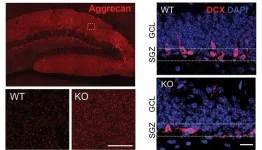(Press-News.org) Researchers have reached an agreement on how best to measure the severity and impact of Long COVID by identifying a “Core Outcome Measure Set” (COMS).
The research, published in Lancet Respiratory Medicine is co-led by the Institute of Psychiatry, Psychology & Neuroscience (IoPPN) at King’s College London and in collaboration with the World Health Organisation (WHO).
COMS are designed to help researchers and clinicians measure symptoms and impacts of disorders such as Long COVID in the same way, which optimises how data can be compared and summarised. Researchers say this will accelerate the understanding of, and the development of treatments for, Long COVID with major global impacts.
Symptoms that persist or develop after COVID‑19 are known as Long COVID but are also described with other names such as Post COVID-19 Condition, Post Acute Sequelae of COVID-19 (PASC) or Post-COVID Syndrome. Common symptoms include fatigue, shortness of breath, pain, exercise intolerance and cognitive dysfunction (‘brain fog’) but patients can experience a wide range of other symptoms across all bodily systems making identification of the key symptoms, and how to measure them, challenging.
The study involved identifying the ways in which Long COVID and its symptoms and impacts have been measured to date, selecting the most popular ones that could be used in all settings and then summarising and presenting these to a large international group of experts and patients in a series of surveys and then in a final ‘consensus meeting’ to identify, where possible, agreement on what the best measurement instrument (or instruments) are. The surveys used a ‘Delphi technique’ to reach consensus amongst the stakeholders. This is a well-established approach in which participants are asked their opinions in a first round and then shown the results of others and given the chance to rethink their views and this is repeated in subsequent rounds until consensus is achieved.
Dr Tim Nicholson, a Reader in Neuropsychiatry and one of the study’s co-leads from King’s IoPPN said, “The development of this Core Outcome Measure Set for Long COVID by the global research community in partnership with patients with lived experience has set out a key plank in the development of evidence-based treatments for this new condition to allow the optimisation, coordination and efficient collation of data in research and clinical services.”
The research team had previously applied a similar methodology to achieve agreement on what aspects of Long COVID - so called ‘outcome domains’ – should be in the minimum ‘Core Outcome Set’ and therefore measured in all studies and clinical services. 12 outcome domains were agreed on in a research paper published earlier this year1.
The research was funded by the UK’s National Institute for Health and Care Research (NIHR) and both planned and delivered in close collaboration with Long COVID patients and organisations.
Professor Nick Lemoine, Medical Director at the NIHR Clinical Research Network said, "This NIHR-funded research is taking us a step closer to having a clear and consistent way to measure the impact of long COVID - this is a vital tool to help speed up research to find the most effective treatments. Researchers and patients have worked closely together to agree on measures that encompass people's lived experience of Long COVID."
Dr Margaret O’Hara, from Long COVID Support said, “People with Long COVID, from Long Covid Support and other groups, have been involved in all stages of the design and implementation of this study. It is important to us because we need research to measure symptoms that are relevant, and to use measurement tools that can capture our actual experience. We also need researchers around the world to use the same instruments so that studies can be compared and we can rapidly build a body of evidence to assess if treatments work. The clock is ticking for people with Long Covid, we urgently need treatments and we will only get them through research. This study will help to quicken the pace at which evidence can be gathered.”
The research was co-led by Professor Paula Williamson and Dr Sarah Gorst at the University of Liverpool, Dr Daniel Munblit, Reader in Paediatrics at Florence Nightingale Faculty of Nursing, Midwifery & Palliative Care, King’s College London and Sechenov University, Russia and Professor Dale Needham at Johns Hopkins University, USA.
The researchers are now seeking to publicise these recommendations so that they are adopted by the scientific and clinical communities. Further work is also planned to update the COMS as new data on this new disorder emerges and how best to measure its improvement.
Professor Williamson said, “This research has significantly narrowed down the range of preferred outcome measurement instrument options for researchers and clinicians to consider.”
Professor Needham added, “This project helps open the door to new research around measurement instruments for core outcomes that did not reach consensus.”
Dr Gorst said, “We are extremely grateful to 594 health professionals, researchers, people with lived experience and their family members who participated in this study.”
Dr Munblit concluded, “We sincerely hope that the outcomes of the project will be widely implemented worldwide, including low resource settings. It is important to note that we have also just completed a PC-COS Children project with results to be published soon, which defined a Core Outcome Measurement Set for Long COVID for paediatric population so all age populations are covered now.”
The project was in collaboration with the World Health Organisation (WHO), the Core Outcome Measures in Effectiveness Trials (COMET) Initiative, the International Severe Acute Respiratory and Emerging Infection Consortium (ISARIC)
Ends
END
How to measure improvement in Long COVID identified in an international consensus study
2023-11-03
ELSE PRESS RELEASES FROM THIS DATE:
Human insulin less temperature-sensitive than previously thought
2023-11-03
A new Cochrane review has found that insulin can be kept at room temperature for months without losing potency, offering hope to people living with diabetes in regions with limited access to healthcare or stable powered refrigeration. This affects millions of people living in low- and middle-income countries, particularly in rural areas, as well as people whose lives have been disrupted by conflict or natural disasters.
Human insulin is a hormone produced by the body that helps turn food into energy and controls blood sugar levels. People with diabetes cannot make enough insulin and those with type 1 diabetes have to inject insulin several times a day, typically before every meal. ...
Study reveals untapped potential to increase eye donations needed for sight-restoring surgeries
2023-11-03
EMBARGOED: Not for Release Until 00:01 AM (UK Time) on Friday 3 November 2023
New research highlights the need for routine discussions about eye donation in end-of-life care clinical settings
Less than four per cent of eligible patients in end-of-life care settings were asked to consider eye donation
Patients had positive views about eye donation, but most did not know it could be an option for them
Staff need training and guidance to support discussing eye donation with patients
A new study has found there is significant scope to increase the number of eye donations from patients cared for in hospice and palliative care settings - donations which are desperately needed for ...
Penn Medicine researchers develop gene editing approaches for phenylketonuria treatment
2023-11-02
PHILADELPHIA— Phenylketonuria (PKU) is a rare newborn genetic disease that impacts between 1 in 10,000 to 1 in 20,000 people, depending on the individuals’ genetic ancestry. PKU causes an amino acid—called phenylalanine (Phe)—to build up in the bloodstream. Uncontrolled PKU can lead to intellectual disability, psychiatric issues, and seizures. While current therapies can partially improve outcomes, they require meticulous, lifelong compliance that is very difficult for most patients. ...
Mount Sinai researchers detail mechanism of a key protein implicated in age-related brain dysfunction
2023-11-02
Mount Sinai researchers have shed valuable light on the mechanism of a key protein that regulates the plasticity and function of the hippocampus, a key brain region involved in memory and learning, and that decreases with age in mice.
The team’s findings, published in Molecular Psychiatry, could pave the way for a better understanding of how the protein, known as tissue inhibitor of metalloproteinases 2 (TIMP2), could potentially be targeted in age-related disorders like Alzheimer’s disease to help restore ...
UH researcher tackles mysterious Z-RNA structure and its potential connection to diseases
2023-11-02
University of Houston Assistant Professor of Biology and Biochemistry Quentin Vicens has been awarded a $1.2 million grant from the National Institute of General Medical Sciences to unravel the mystery of Z-RNA – an enigmatic RNA structure within our cells that plays a critical role in immune response. This work is in collaboration with the laboratory of Beat Vögeli, associate professor at the University of Colorado and co-recipient of the award.
Vicens, Vögeli and their research teams are on a mission to understand how Z-RNA forms, how often it appears in our genetic material and what it means for ...
Different antibiotics’ effects on gut microbes may impact hypertensive organ damage
2023-11-02
Highlights
In a preclinical study, altering the intestinal microbiome with narrow-spectrum antibiotics affected organ damage associated with hypertension.
Results from the study will be presented at ASN Kidney Week 2023 November 1–November 5.
Philadelphia, PA (November 2, 2023) — New research in rodents indicates that altering gut microbes may affect the development of organ damage associated with hypertension. The findings will be presented at ASN Kidney Week 2023 November 1–November ...
Are sodium-glucose cotransporter-2 inhibitors safe for patients with diabetes and cancer?
2023-11-02
Highlights
Investigators found that in patients with diabetes and cancer, sodium glucose cotransporter-2 inhibitors were associated with a higher risk of diabetic ketoacidosis and fracture and a lower risk of acute kidney injury and urinary tract infection compared with glucagon-like peptide 1 receptor agonists.
Results from the study will be presented at ASN Kidney Week 2023, November 1–November 5.
Philadelphia, PA (November 2, 2023) — Sodium-glucose cotransporter-2 inhibitors (SGLT2i) have heart- and kidney-related benefits for patients with and without diabetes ...
Wildfire air pollution may increase risks of hospitalization and death among patients on dialysis
2023-11-02
Highlights
Among individuals receiving in-center hemodialysis treatment in Washington, Oregon, and California, exposure to wildfire-related air pollution was associated with elevated risks of hospitalization and mortality.
Results from the study will be presented at ASN Kidney Week 2023 November 1–November 5.
Philadelphia, PA (November 2, 2023) — In analyses of data from western US states, increases in wildfire-related air pollution around dialysis clinics were linked to higher rates of hospitalizations and deaths among patients. The research will be presented at ASN Kidney Week 2023 ...
Simple automated tool prompts physicians to screen patients with diabetes for kidney disease
2023-11-02
Highlights
A tool that provides an automated prompt to physicians increased kidney disease screening in patients with type 2 diabetes.
Results from the study will be presented at ASN Kidney Week 2023 November 1–November 5.
Philadelphia, PA (November 2, 2023) — Investigators have implemented an automated health maintenance tool created by the National Kidney Foundation into electronic medical records to prompt primary care physicians to screen for chronic kidney disease (CKD) in adult patients ...
FSU researchers capture high-resolution images of magnesium ions interacting with CRISPR gene-editing enzyme
2023-11-02
The gene-editing technology known as CRISPR has led to revolutionary changes in agriculture, health research and more.
In research published in Nature Catalysis, scientists at Florida State University produced the first high-resolution, time-lapsed images showing magnesium ions interacting with the CRISPR-Cas9 enzyme while it cut strands of DNA, providing clear evidence that magnesium plays a role in both chemical bond breakage and near-simultaneous DNA cutting.
“If you are cutting genes, you don’t want to have only one strand of DNA broken, because the cell can repair it easily without editing. You want both strands to be broken,” said Hong ...



